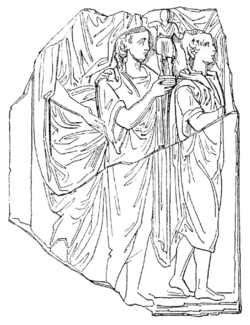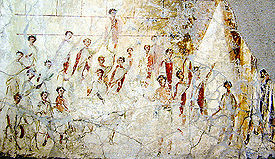
Compitalia
Encyclopedia

Religion in ancient Rome
Religion in ancient Rome encompassed the religious beliefs and cult practices regarded by the Romans as indigenous and central to their identity as a people, as well as the various and many cults imported from other peoples brought under Roman rule. Romans thus offered cult to innumerable deities...
, the Compitalia (Latin
Latin
Latin is an Italic language originally spoken in Latium and Ancient Rome. It, along with most European languages, is a descendant of the ancient Proto-Indo-European language. Although it is considered a dead language, a number of scholars and members of the Christian clergy speak it fluently, and...
: Ludi
Ludi
Ludi were public games held for the benefit and entertainment of the Roman people . Ludi were held in conjunction with, or sometimes as the major feature of, Roman religious festivals, and were also presented as part of the cult of state.The earliest ludi were horse races in the circus...
Compitalicii) was a festival celebrated once a year in honor of the Lares Compitales
Lares
Lares , archaically Lases, were guardian deities in ancient Roman religion. Their origin is uncertain; they may have been guardians of the hearth, fields, boundaries or fruitfulness, hero-ancestors, or an amalgam of these....
, household deities
Household deity
A household deity is a deity or spirit that protects the home, looking after the entire household or certain key members. It has been a common belief in pagan religions as well as in folklore across many parts of the world....
of the crossroads
Crossroads (culture)
In folk magic and mythology, crossroads may represent a location "between the worlds" and, as such, a site where supernatural spirits can be contacted and paranormal events can take place...
, to whom sacrifices were offered at the places where two or more ways meet. The word comes from the Latin compitum, a cross-way.
This festival is more ancient than the building of Rome
Rome
Rome is the capital of Italy and the country's largest and most populated city and comune, with over 2.7 million residents in . The city is located in the central-western portion of the Italian Peninsula, on the Tiber River within the Lazio region of Italy.Rome's history spans two and a half...
. It is said by some writers to have been instituted by Tarquinius Priscus
Tarquinius Priscus
Lucius Tarquinius Priscus, also called Tarquin the Elder or Tarquin I, was the legendary fifth King of Rome from 616 BC to 579 BC. His wife was Tanaquil.-Early life:According to Livy, Tarquinius Priscus came from the Etruria...
in consequence of the miracle attending the birth of Servius Tullius
Servius Tullius
Servius Tullius was the legendary sixth king of ancient Rome, and the second of its Etruscan dynasty. He reigned 578-535 BC. Roman and Greek sources describe his servile origins and later marriage to a daughter of Lucius Tarquinius Priscus, Rome's first Etruscan king, who was assassinated in 579 BC...
, who was supposed to be the son of a Lar Familiaris
Lares Familiares
Lares Familiares were household tutelary deities of ancient Roman religion. The singular form is Lar Familiaris....
, or family guardian deity.
Dionysius
Dionysius of Halicarnassus
Dionysius of Halicarnassus was a Greek historian and teacher of rhetoric, who flourished during the reign of Caesar Augustus. His literary style was Attistic — imitating Classical Attic Greek in its prime.-Life:...
says that Servius Tullius founded the festival, which he describes as it was celebrated in his time. Dionysius relates that the sacrifices consisted of honey
Honey
Honey is a sweet food made by bees using nectar from flowers. The variety produced by honey bees is the one most commonly referred to and is the type of honey collected by beekeepers and consumed by humans...
-cakes () presented by the inhabitants of each house; and that the people who assisted as ministering servants at the festival were not free men, but slaves, because the Lares took pleasure in the service of slaves. He further adds that the Compitalia were celebrated a few days after the Saturnalia
Saturnalia
Saturnalia is an Ancient Roman festival/ celebration held in honour of Saturn , the youngest of the Titans, father of the major gods of the Greeks and Romans, and son of Uranus and Gaia...
with great splendor, and that the slaves on this occasion had full liberty to do as they pleased.
During the celebration of the festival, each family placed the statue of the underworld goddess Mania
Mania (mythology)
In Roman and Etruscan mythology, Mania was the goddess of the dead. She, along with Mantus, ruled the underworld. She was said to be the mother of ghosts, the undead, and other spirits of the night, as well as the Lares and the Manes...
at the door of their house. They also hung up at their doors figures of wool representing men and women, accompanying them with humble requests that the Lares and Mania would be contented with those figures, and spare the people of the house. Slaves offered balls or fleeces of wool instead of human figures.
Macrobius says that the celebration of the Compitalia was restored by the Etruscan king Tarquinius Superbus in response to an oracle
Oracle
In Classical Antiquity, an oracle was a person or agency considered to be a source of wise counsel or prophetic predictions or precognition of the future, inspired by the gods. As such it is a form of divination....
that "they should sacrifice heads (capita) for heads." The oracle was taken to mean that in order to maintain the health and prosperity of each family, children should be sacrificed to Mania, identified in this case as the mother of the Lares. But Brutus
Lucius Junius Brutus
Lucius Junius Brutus was the founder of the Roman Republic and traditionally one of the first consuls in 509 BC. He was claimed as an ancestor of the Roman gens Junia, including Marcus Junius Brutus, the most famous of Caesar's assassins.- Background :...
, after overthrowing the line of Tarquin kings, instead satisfied the oracle by exploiting a verbal loophole, substituting "heads" of garlic and poppies.

Roman Republic
The Roman Republic was the period of the ancient Roman civilization where the government operated as a republic. It began with the overthrow of the Roman monarchy, traditionally dated around 508 BC, and its replacement by a government headed by two consuls, elected annually by the citizens and...
, but they were suppressed by command of the senate
Roman Senate
The Senate of the Roman Republic was a political institution in the ancient Roman Republic, however, it was not an elected body, but one whose members were appointed by the consuls, and later by the censors. After a magistrate served his term in office, it usually was followed with automatic...
in 68 BCE. Calpurnius Piso
Lucius Calpurnius Piso Caesoninus
Lucius Calpurnius Piso Caesoninus was a statesman of ancient Rome and the father-in-law of Julius Caesar through his daughter Calpurnia Pisonis...
was charged by Cicero
Cicero
Marcus Tullius Cicero , was a Roman philosopher, statesman, lawyer, political theorist, and Roman constitutionalist. He came from a wealthy municipal family of the equestrian order, and is widely considered one of Rome's greatest orators and prose stylists.He introduced the Romans to the chief...
with violating the decree by allowing the games to be celebrated during his consulship
Roman consul
A consul served in the highest elected political office of the Roman Republic.Each year, two consuls were elected together, to serve for a one-year term. Each consul was given veto power over his colleague and the officials would alternate each month...
in 58. The festival itself still continued to be observed, even if the games were abolished.
During the civil wars of the 40s
Caesar's civil war
The Great Roman Civil War , also known as Caesar's Civil War, was one of the last politico-military conflicts in the Roman Republic before the establishment of the Roman Empire...
, the festival fell into disuse, and was accordingly during the program of religious reforms carried out by Augustus
Augustus
Augustus ;23 September 63 BC – 19 August AD 14) is considered the first emperor of the Roman Empire, which he ruled alone from 27 BC until his death in 14 AD.The dates of his rule are contemporary dates; Augustus lived under two calendars, the Roman Republican until 45 BC, and the Julian...
. As Augustus was now the pater patriae
Pater Patriae
Pater Patriae , also seen as Parens Patriae, is a Latin honorific meaning "Father of the Country," or more literally, "Father of the Fatherland".- Roman history :...
, the worship of the old Lares was discontinued, and the Lares of the emperor consequently became the Lares of the state. Augustus set up Lares or penates at places where two or more ways met and instituted an order of priests to attend to their worship. These priests were chosen from the libertini
Freedman
A freedman is a former slave who has been released from slavery, usually by legal means. Historically, slaves became freedmen either by manumission or emancipation ....
, people who had been legally freed from slavery, and were called Augustales.
The Compitalia belonged to the feriae conceptivae, that is, festivals which were celebrated on days appointed annually by the magistrates
Roman Magistrates
The Roman Magistrates were elected officials in Ancient Rome. During the period of the Roman Kingdom, the King of Rome was the principal executive magistrate. His power, in practice, was absolute. He was the chief priest, lawgiver, judge, and the sole commander of the army...
or priests. The exact day on which this festival was celebrated appears to have varied, though it was always in the winter, at least in the time of Varro
Varro
Varro was a Roman cognomen carried by:*Marcus Terentius Varro, sometimes known as Varro Reatinus, the scholar*Publius Terentius Varro or Varro Atacinus, the poet*Gaius Terentius Varro, the consul defeated at the battle of Cannae...
, as observed by Isaac Casaubon
Isaac Casaubon
Isaac Casaubon was a classical scholar and philologist, first in France and then later in England, regarded by many of his time as the most learned in Europe.-Early life:...
. Dionysius again relates that it was celebrated a few days after the Saturnalia, and Cicero that it fell on the Kalends
Kalends
The Calends , correspond to the first days of each month of the Roman calendar. The Romans assigned these calends to the first day of the month, signifying the start of the new moon cycle...
of January; but in one of his letters to Atticus
Titus Pomponius Atticus
Titus Pomponius Atticus, born Titus Pomponius , came from an old but not strictly noble Roman family of the equestrian class and the Gens Pomponia. He was a celebrated editor, banker, and patron of letters with residences in both Rome and Athens...
, he speaks of it as occurring on the fourth before the Nones of January, that is, January 2. The exact words with which the festival was announced are preserved by Macrobius and Aulus Gellius
Aulus Gellius
Aulus Gellius , was a Latin author and grammarian, who was probably born and certainly brought up in Rome. He was educated in Athens, after which he returned to Rome, where he held a judicial office...
:
Further reading
- Ittai Gradel, Emperor Worship and Roman Religion (Oxford University Press, 2002), pp. 117 ff., limited preview online.
- Celia E. Schultz, Women's Religious Activity in the Roman Republic (University of North Carolina Press, 2006), pp. 13 ff., limited preview online.
- Richard C. Beacham, Spectacle Entertainments of Early Imperial Rome (Yale University Press, 1999), pp. 55ff., limited preview online.
- Ray Laurence, Roman Pompeii: Space and Society (Routledge, 1996), especially pp. 39 ff., limited preview online.
- John Bert Lott, The Neighborhoods of Augustan Rome (Cambridge University Press, 2004), especially pp. 37ff., limited preview online.
- Tesse Dieder Stek, Sanctuary and Society in Central-Southern Italy (Ipskamp PrintPartners, 2008) http://dare.uva.nl/document/121455

